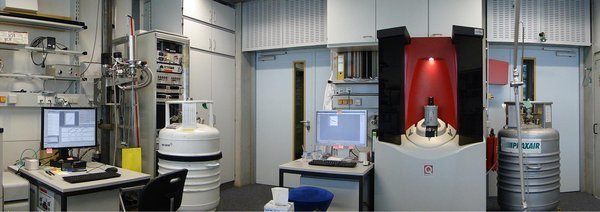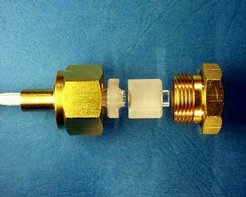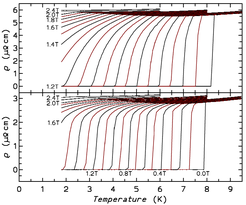
Physical Characterization
A basic screening of new compounds and materials created in the Solid State Chemistry and Chemical Metal Science departments is the task of the Physical Characterization Workgroup. Special provisions have been developed which allow also measurements on highly air-sensitive materials. Also, the equipment is used for in-depth investigations on physical properties. Two magnetometer and two magnet cryostat systems allow for a high troughput. Several specialized options are available for a wide range of measurements.

Figure 1: Isothermal magnetization curves at various temperatures for a single crystal sample of a halfmetallic ferromagnet
© MPI-CPfS
Magnetization / magnetic susceptibility
- Two SQUID magnetometers
MPMS-3 and MPMS-XL7 - temperatures 1.8K-400K and 300K-800K (oven)
- magnetic field 0.1mT-7.0T
- 2 axis sample rotator
- range up to 300emu
- pressure cells

Figure 4: Specific heat capacity of a series of isostructural compounds with filled skutterudite structure
© MPI-CPfS
Specific heat capacity
- relaxation method 0.35K-380K, magnetic field to +-9T
- high-accuracy measurements possible
- adiabatic scanning method
5K-300K (experimental)

Figure 3: Device for the measurement of the electrical resistivity of powder samples
© MPI-CPfS
Electrical transport properties
- dc resistivity 4K-320K, also on
highly air sensitive samples - powder samples, high-resistivity materials 4-320K
- ac and dc resistivity 0.35K-380K, magnetic field to +-9T
- ac resistivity down to 0.08K (adiabatic demagnetization)

Figure 3: Cryostat inside an Argon-filled glove box for resistivity measurements on highly air- and moisture-sensitive samples
© MPI-CPfS

Figure 5: Electrical resistivity in various magnetic fields for two superconducting compounds with filled skutterudite structure
© MPI-CPfS
Magneto-electrical and thermal transport properties
- temperatures 0.35K-380K,
magnetic field to +-9T - transversal and longitudinal magnetoresistance
- Hall effect
- horizontal sample rotator (0-360 degree)
- thermopower (Seebeck coefficient),
1.8K-380K and 300K-1300K - thermal conductivity 1.8K-380K, magnetic fields to +-9T
- thermal diffusivity by Laser Flash method, 190K-1270K




